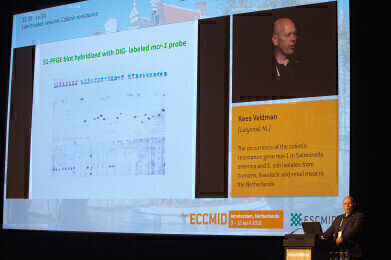News
Antibiotic Resistance Late Breaking Abstracts Revealed at ECCMID
Apr 12 2016
A recently discovered genetic mechanism allowing bacteria to develop and transfer resistance to colistin, one of the last-resort antibiotics, has been present in many countries across the world for more than a decade, according to late-breaking data presented at ECCMID.
Researchers presented findings on the prevalence of the mcr-1 gene, a transferable genetic mechanism of antimicrobial-resistance to colistin - the last resort antibiotic in a number of circumstances. At a sesson dedicated to late-breaking abstracts on colistin resistance, researchers presented evidence on the prevalence of the gene in bacteria (including Enterobacteriaceae such as Escherichia coli,Salmonella or Klebsiella). Scientists also presented evaluations of treatment and management options, as well as new diagnostic methods and assays to help identify mcr-1. The late-breaking data was released at ECCMID 2016 – the annual meeting of the European Society of Clinical Microbiology and Infectious Disease (ESCMID).
The mcr-1 gene is particularly significant as it can be carried by plasmids, small DNA molecules, which can be transferred between single-celled organisms, such as bacteria, through so-called horizontal gene transfer. These genes can then be transferred sideways to other strains or species, not just vertically down to the offspring by replication. Horizontal gene transfer is the primary reason for antibiotic resistance.
The mechanism, first discovered in an E. coli strain from a pig in China in November 2015, has over the past months been identified in bacterial samples across the world. The increased prevalence of plasmid-mediated resistance is causing major concern among infectious disease specialists, because it threatens to reduce options to treat infections and is creating new resistant bacterial strains.
Other late-breaking abstracts dealt with topics including meningitis, pulmonary tuberculosis, Zika and human papilloma virus.
Abstracts described the long-term clinical implications of Zika virus exposure, demonstrating that it can produce a number of neurological and ocular complications. Additionally, scientists found that the drug bedaquiline used to treat multidrug-resistant tuberculosis was a safe and effective long-term treatment option in selected cases. Finally, urgent changes were recommended to the technology and temperature management during open-heart surgery to prevent the growth of M. chimaera bacteria.
For further details on the data and conference proceedings visit www.escmid.org
Digital Edition
Lab Asia Dec 2025
December 2025
Chromatography Articles- Cutting-edge sample preparation tools help laboratories to stay ahead of the curveMass Spectrometry & Spectroscopy Articles- Unlocking the complexity of metabolomics: Pushi...
View all digital editions
Events
Jan 21 2026 Tokyo, Japan
Jan 28 2026 Tokyo, Japan
Jan 29 2026 New Delhi, India
Feb 07 2026 Boston, MA, USA
Asia Pharma Expo/Asia Lab Expo
Feb 12 2026 Dhaka, Bangladesh



















